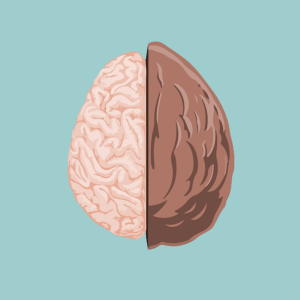
5.1M
Downloads
247
Episodes
I’m Emma McAdam, a Licensed Marriage and Family Therapist and my mission is to make mental health resources more easy to access. I take therapy skills and psychological research and condense them down into bite-sized nuggets of help. I’m here to spread the message that while mental illness is real, it’s common, it’s debilitating, it’s also treatable. There are dozens of research-backed approaches to treating depression, anxiety, and other mental illness. Change, growth, and healing are possible. Please keep courage! Try one little thing every day to improve your life and health and things can get so much better! Therapy in a Nutshell, and the information provided by Emma McAdam, is solely intended for informational and entertainment purposes and is not a substitute for advice, diagnosis, or treatment regarding medical or mental health conditions. Although Emma McAdam is a licensed marriage and family therapist, the views expressed on this site or any related content should not be taken for medical or psychiatric advice. Always consult your physician before making any decisions related to your physical or mental health. Therapy in a Nutshell and it’s logo are Registered Trademarks of Therapy in a Nutshell, LLC
Episodes

Tuesday Mar 08, 2022
Morning Anxiety? It Might Be Cortisol Awakening Response
Tuesday Mar 08, 2022
Tuesday Mar 08, 2022
If you go to bed worrying about your day, your body’s like, “Hey, let me help you out. I’m going to give you a dump truck load of cortisol the minute you wake up, doesn’t that sound great?” Then you may experience anxiety upon waking. This is called the cortisol awakening response. It's connected to your circadian rhythm, and depending on how you look at it, it’s a blessing or a curse.
If you wake up to anxiety first thing in the morning, you know how uncomfortable it can be. In this video we’re going to talk about how cortisol is different in the morning and what you can do about it to better decrease your morning anxiety.
Cortisol is a stress hormone that your adrenal glands pump out in response to fear or stress. It helps your body prepare for action and it makes your heart beat faster, and can make you feel jittery and anxious. Even for people without high levels of stress cortisol levels are generally highest within the first hour of waking up.
Some people wake up with a jolt of anxiety, so powerful that it makes the whole day seem overwhelming. Some people feel frozen in their beds. Some people get activated, irritable, jittery about their day or engage in frenetic activity (this one’s me). Or that jolt of cortisol makes some people wake up to panic attacks or feel like they’re about to have one. Not the way you wanted to wake up.
Why would your body do that? Cortisol’s function is to help you get alert and perform. If you’re playing soccer, cortisol helps you get pumped up and play hard. Cortisol can help you be motivated to finish a report for work or jump out of the way of a speeding car.
But if you go to bed worrying about everything you have to do tomorrow, the brain makes a secret plan: “I’m going to help my human get super activated right when he wakes up.” So it plans a little surprise party for you. Alarm goes off, Surprise! Dump-truck load of cortisol.”
Anxiety is an emotion. Emotions aren’t just bad things that happen to you, emotions serve a function, and when it’s functional anxiety helps you take appropriate action to stay safe and get things done.
But when we have too much anxiety that we don’t know what to do with, anxiety can trap you in a cycle of worrying about things without taking action, and make it hard to complete tasks.
Looking for affordable online counseling? My sponsor, BetterHelp, connects you to a licensed professional for $65/week. Try it now for 10% off: https://betterhelp.com/therapyinanutshell
Learn more in one of my in-depth mental health courses: https://courses.therapyinanutshell.com/?utm_source=podcast&utm_medium=03082022
Support my mission on Patreon: https://www.patreon.com/therapyinanutshell
Sign up for my newsletter: https://www.therapynutshell.com?utm_medium=YTDescription&utm_source=podcast
Check out my favorite self-help books: https://kit.co/TherapyinaNutshell/best-self-help-books
Therapy in a Nutshell and the information provided by Emma McAdam are solely intended for informational and entertainment purposes and are not a substitute for advice, diagnosis, or treatment regarding medical or mental health conditions. Although Emma McAdam is a licensed marriage and family therapist, the views expressed on this site or any related content should not be taken for medical or psychiatric advice. Always consult your physician before making any decisions related to your physical or mental health.
In therapy I use a combination of Acceptance and Commitment Therapy, Systems Theory, positive psychology, and a bio-psycho-social approach to treating mental illness and other challenges we all face in life. The ideas from my videos are frequently adapted from multiple sources. Many of them come from Acceptance and Commitment Therapy, especially the work of Steven Hayes, Jason Luoma, and Russ Harris. The sections on stress and the mind-body connection derive from the work of Stephen Porges (the Polyvagal theory), Peter Levine (Somatic Experiencing) Francine Shapiro (EMDR), and Bessel Van Der Kolk. I also rely heavily on the work of the Arbinger institute for my overall understanding of our ability to choose our life's direction. And deeper than all of that, the Gospel of Jesus Christ orients my personal worldview and sense of security, peace, hope, and love https://www.churchofjesuschrist.org/comeuntochrist/believe
If you are in crisis, please contact the National Suicide Prevention Hotline at https://suicidepreventionlifeline.org/ or 1-800-273-TALK (8255) or your local emergency services.
Copyright Therapy in a Nutshell, LLC

No comments yet. Be the first to say something!